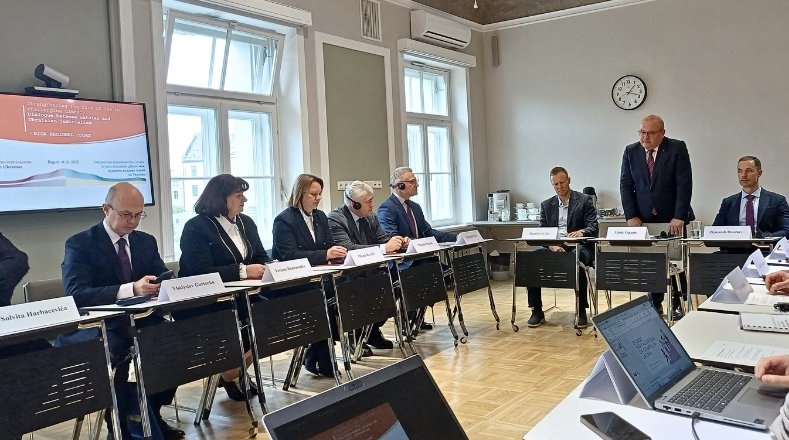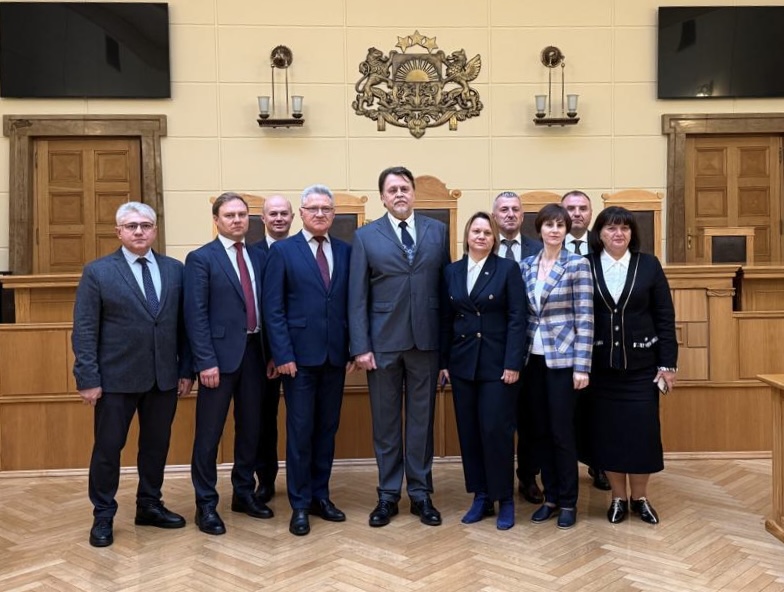
From 6 to 8 October 2025, a delegation of representatives of the judicial authorities of Ukraine visited Riga on a working visit organised by the Judicial Council of the Republic of Latvia within the framework of the ongoing dialogue “Strengthening the Rule of Law in Times of Challenges: A Dialogue between the Judiciaries of Latvia and Ukraine.”
The purpose of the visit was to exchange practices in strengthening the institutional capacity of the judiciary, to discuss current challenges in the field of justice, and to deepen Ukrainian-Latvian cooperation in judicial administration.
The Ukrainian delegation included Hryhorii Usyk, Chairman of the High Council of Justice, members of the HCJ, and representatives of the Supreme Court.
On the Latvian side, participants included Aigars Strupišs, President of the Supreme Court of Latvia, Chairs of the Civil, Administrative, and Criminal Chambers, representatives of disciplinary bodies, as well as judges of regional and district courts. The events also brought together representatives of the judicial administration and prominent Latvian legal experts with experience in European Union institutions.
Andrii Pasichnyk, Chairman of the High Qualification Commission of Judges of Ukraine (HQCJ), delivered two presentations – on the process of judicial selection and career development, and on the qualification and regular assessment of judges in Ukraine.
He presented to the Latvian colleagues the results of the work of the renewed composition of the HQCJ, which resumed its full activity in June 2023, and shared information about the updated methodology of competitive procedures and the outcomes of the large-scale competition for local courts involving over 9,000 candidates. This selection process was conducted in parallel with other procedural activities of the Commission, which became a subject of professional discussion during the meetings. The Latvian side noted the difference in approaches applied by national judicial governance bodies. In Latvia, competitions are usually held sequentially, one after another, with up to one hundred candidates in each procedure. The comparison of the respective models made it possible to discuss organisational and procedural aspects – such as workload planning, ensuring transparency and evaluation efficiency, and the potential for adapting best practices in both countries.
“We work with thousands of candidates simultaneously while maintaining uniform standards of quality and transparency. This is possible thanks to updated approaches and digital tools,” noted Andrii Pasichnyk.
The HQCJ Chairman also outlined the specific features of competitions for the High Anti-Corruption Court (HACC) and specialised administrative courts. He emphasised the role of international experts and their contribution to ensuring transparency and procedural efficiency.
The Latvian participants expressed particular interest in the Ukrainian experience of conducting selection and evaluation procedures under martial law.
Mr Pasichnyk explained how safety is ensured during testing and interviews in Ukraine, including the use of secured power sources, shelters, and the continuation of work even during air raid alerts, under safe conditions.
“Even during air raids, we do not suspend judicial selection and evaluation. We have everything necessary for this. It is not only about personnel policy — it is about the resilience of the judiciary and trust in the state,” emphasised the HQCJ Chairman.
The Latvian colleagues noted that the Ukrainian approach to ensuring institutional capacity and procedural continuity could serve as an example for other countries in the region, given the high level of security threats from the aggressor state, the russian federation.
The parties also discussed qualification assessment procedures for suitability for the position held and regular assessment of judges. The Latvian colleagues noted the progressive nature of Ukraine’s approach, as the analogical Latvian procedure foresees an opportunity to dismiss judge from the position held, whereas the Ukrainian procedure aims to identify opportunities for judges’ professional development.
The program of the visit was designed as a practice-oriented series of events, including panel discussions at the Supreme Court of Latvia, thematic field meetings at the Riga Regional Court, the Kurzeme and Zemgale District Courts, as well as working meetings with court administrations. This format ensured a combination of strategic dialogue at the level of the highest judicial authority with an applied analysis of issues of judicial administration and the organisation of justice at the regional level.


